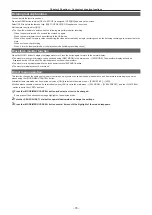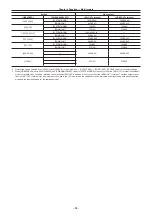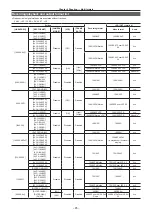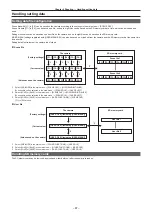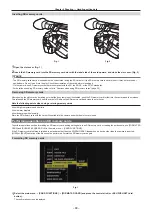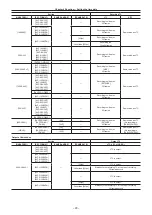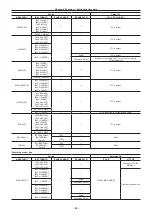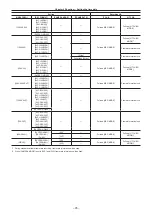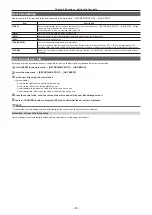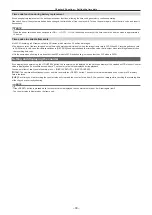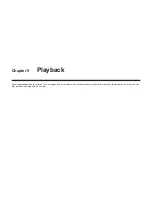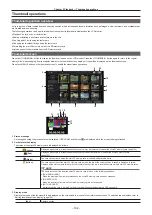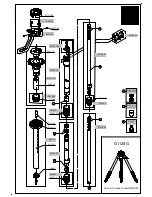
– 92 –
Chapter 4 Shooting — Setting the time data
Setting the time data
The camera provides time codes, user bits, and date and time (real time) data as time data, and they are recorded in the frame in sync with video. They
are also recorded as data for clip metadata files.
Definition of time data
r
Time code
It can be switched between [REC RUN] and [FREE RUN] in the main menu
→
[RECORDING SETUP]
→
[TCG].
f
[FREE RUN]:
The time code is constantly advanced even when the power is turned off, and it can be handled in the same way as the actual time.
f
[REC RUN]:
It can be recorded as a continuous value by regeneration to the time code of clip recorded to the microP2 memory card.
@
@
NOTE
t
In the following case, the values are not continuous.
-
When deleting recorded clips
-
When switching to 24PN and 30PN (25PN)
-
When recording is interrupted due to a malfunction of [REC WARNING], etc. during recording.
r
User bits
Two types of user bits are built in.
f
LTC UB: It is recorded as LTC, and also output as LTC for the HD SDI signal.
f
VITC UB: Recorded as VITC (recorded to VIDEO AUX area by DVCPRO). It is also output as VITC of the HD SDI signal.
The user setting value, time, date, the same value as time codes, frame rate information of the camera recording, etc. can be individually selected to be
recorded in LTC UB.
VITC UB records the camera frame rate information.
The LTC UB value of the recording start time can be recorded on the user bits of the clip metadata.
r
Date/time (real time)
f
The year, month, date, and time can be displayed on the output video such as viewfinder or LCD monitor with the internal clock.
f
The internal clock is used for measuring the free run time code while the power is off and as time and year/month/day data of the user bits. It is also
used as the reference for file generation times during clip recording, which determine the sorting order of thumbnails and the order of playback.
f
It is also used to generate clip metadata and UMID (Unique Material Identifier).
For details, refer to “Setting the date/time of the internal clock” (page 36).
Recording of time codes and user bits
Recording of time codes
Setting
Recording TC
[LINE&FREQ]
[REC FORMAT]
[CAMERA MODE]
[FRAME RATE]
LTC
VITC
[1080-59.94P]
[AVC-I100/60P]
[AVC-G25/60P]
[AVC-G12/60P]
—
—
Recording run/free run
[DF]/[NDF]
30 frames
Same value as LTC
[AVC-I200/30PN]
[AVC-G50/30PN]
[AVC-G25/30PN]
[AVC-G12/30PN]
—
Recording run/free run
[DF]/[NDF]
30 frames
[AVC-I100/30PN]
[30fps]
Recording run/free run
[DF]/[NDF]
30 valid frames
Other than [30fps]
Recording run
[DF]/[NDF]
30 valid frames
[AVC-I200/24PN]
[AVC-G50/24PN]
[AVC-G25/24PN]
[AVC-G12/24PN]
—
Recording run/free run
[NDF]
24 frames
[AVC-I100/24PN]
[24fps]
Recording run/free run
[NDF]
24 valid frames
Other than [24fps]
Recording run
[NDF]
24 valid frames
[1080-59.94i]
[AVC-I200/60i]
[AVC-I100/60i]
[AVC-I50/60i]
[AVC-G50/60i]
[AVC-G25/60i]
[AVC-G12/60i]
—
—
Recording run/free run
[DF]/[NDF]
30 frames
Same value as LTC
[DVCPRO HD/60i]
—
—
Summary of Contents for AJ-PX230 Series
Page 12: ...Before using the camera read this chapter Chapter 1 Overview ...
Page 153: ...Maintenance of the camera or frequently asked questions are described Chapter 9 Maintenance ...
Page 161: ...This chapter describes the specifications of this product Chapter 10 Specification ...
Page 169: ...Web Site http www panasonic com Panasonic Corporation 2016 ...

